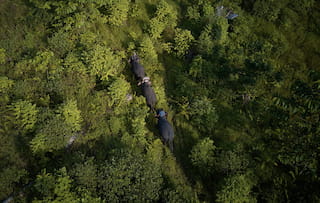IDH and Unilever Continue Collaboration for Sustainable Landscape in Eastern Leuser

In a bid to address the critical issue of deforestation, promote sustainable palm oil production, and build on their successful partnership in the Aceh Tamiang Sustainable Landscape Project, IDH and Unilever have extended their commitment to fostering sustainability in one of Indonesia's last critical tropical rainforest ecosystems in the Leuser ecosystem of Aceh Province.
The eastern region of Aceh, spanning across Aceh Timur and Aceh Tamiang districts, faces a significant deforestation threat due to palm oil expansion. Without intervention, deforestation in Aceh Timur could potentially escalate to 50,000 hectares, driven by land clearing activities in 12 existing oil palm concessions located in the adjacent "No-Go area" near the Leuser Ecosystem. Many of these concessions are not certified under the Roundtable on Sustainable Palm Oil (RSPO) scheme and many lack strong No Deforestation, No Development on Peat, No Exploitation (NDPE) commitments, exacerbating the deforestation challenges alongside encroachment in the region by smallholders.
Under the Eastern Leuser project, also known as "The Aceh Timur Sustainable Landscape Project," IDH and Unilever aim to develop a buffer zone management model for the Leuser ecosystem. This model seeks to ensure forest protection and regeneration while promoting sustainable palm oil sourcing within Aceh Timur's jurisdiction. The project aligns with broader sustainable palm oil initiatives in Aceh Province, aimed at restoring nature and improving community livelihoods. This time, referring to the successful collaboration with the Leuser Ecosystem Forum (known as Forum Konservasi Leuser - FKL) in Aceh Tamiang, IDH and Unilever also decided to engage FKL in the project as the implementing partner.
The project aims to achieve several key objectives:
Commitment to the Aceh Timur PPI (Protection, Production, Inclusion) vision, endorsed by key stakeholders including government entities, mills, plantations, and local civil society organizations.
Enhanced capacities of the PPI Compact Secretariat, which serves as a multi-stakeholder platform to implement the sustainable sourcing area concept. This includes coordinating sustainable palm oil production and restoration activities, addressing grievances through multi-stakeholder solutions, and reporting on the progress of the SourceUp platform at regional and landscape levels.
Attainment of key indicators to support sustainable sourcing in Aceh Timur, including a targeted 30% reduction in deforestation rate from the baseline by project completion, protection of High Conservation Value (HCV)/High Carbon Stock (HCS) areas within 74,000 hectares of priority areas with high deforestation risk, and establishment of Aceh Timur as a verified sourcing area on SourceUp. An updated HCV/HCS assessment will be performed to include a customary area mapping and customary right assessment to support the landscape protection plan. The project will also develop a landscape and jusrisdictional-level traceability and forest and land use monitoring system that consolidate the grievance response mechanism at the landscape level.
Additionally, on forest restoration, the project aims to restore 1,000 hectares of forest through the enrichment of community-based native tree species , natural regeneration, and agroforestry model using at least 100,000 seedlings that will be prepared in the community forest nursery. Engagement with four oil palm estates at high deforestation risk is also planned, with two estates and two palm oil mills expected to commit to and implement NDPE policies and a new business model for sustainable palm oil production aimed at protecting at least 1,000 hectares of HCV/HCS areas.
The continued collaboration between IDH and Unilever in the Eastern Leuser region with the support from implementing partners, demonstrates a concerted effort to combat deforestation and promote sustainable palm oil production. Through multi-stakeholder partnerships and targeted interventions, the project aims to safeguard the integrity of the Leuser ecosystem while supporting sustainable development in Aceh Timur.
